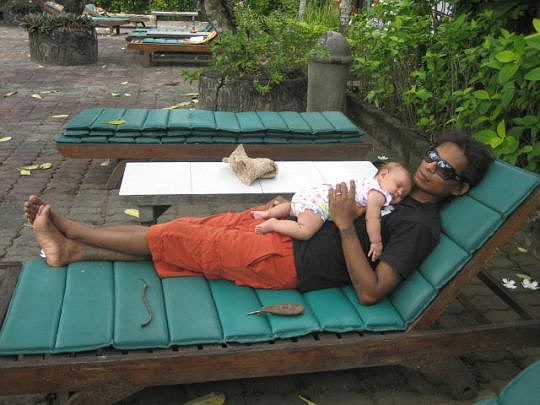Dina Wipsar Andari
Foreign tourist arrivals decreased sharply after the bombings in 2002. Some hotels, such as this one in Sanur, came to depend on the sparser domestic tourist market.Emma Baulch |
The impact of the Bali bombings on the Indonesian economy should not be underestimated. In 2001, Bali generated more than 25 per cent of Indonesia’s foreign exchange earnings, and Bali’s economy accounted for 1.3 per cent of the national economy. Following the first bombing on 12 October 2002, after which many countries issued warnings to citizens planning to travel to Bali, the number of foreign tourists visiting the island declined by 57 per cent. Two weeks after the bombing, average hotel occupancies stood at 18 per cent; in previous years, the average occupancy rate for October was 70 per cent. In a short time, approximately 2.7 million tourism workers were unemployed.
Immediately after the 2002 Bali bomb, and in the interests of improving its image as a tourist destination, the Indonesian government launched a recovery program. The government quickly channelled funds to the Department of Culture and Tourism in Jakarta, which then took full responsibility for the recovery effort. Expressions of sympathy were sent to victims’ families on behalf of the Indonesian people. Detailed and careful intelligence led to the speedy arrest of suspects. Assistance and support for medical and security equipment was sought, security consultation services established, and public, interfaith purification ceremonies and prayer meetings were held.
Taken by surprise
A striking feature of the recovery effort after the first bomb is that it was devised after the attack took place. This is striking because, in 2002, there was widespread international recognition of the tourism industry as a potential soft target of terrorist attack. But such widespread recognition did not contribute much to the capacity of the tourism bureaucracy to prepare for disaster.
One prominent bureaucrat involved in planning the first national recovery program explained that, prior to the first bomb, the government only had strategies for responding to flood or fire. When asked if the events of September 11 prompted tourism industry bureaucrats to consider the possibility of terrorist attack on tourist destinations in Indonesia, he said: ‘No. The objective of Indonesian tourism is to enhance the relations between nations to contribute towards peace, so we thought that the industry wouldn’t be subject to terrorist attack’. Indeed, one Department of Culture and Tourism researcher critically observed: ‘The government was too optimistic that no terrible incident would happen.’
Nevertheless, the Department of Culture and Tourism’s efforts after the first bomb may be deemed successful. In 2004, a record one million domestic and foreign tourists visited Bali. In the same year, Bali won a number of international tourism industry awards, including the World’s Best Tourist Island, which had been awarded to Bali in 2001, 2002 and 2003, and which Bali won again in 2005. Also in 2004, Time magazine recognised Bali as its Most Favorite Destination.
No organisational learning
By early 2005, the future of Bali’s tourism industry was beginning to look promising again. But then, on 1 October, the second bombs struck. The second attack had a different style of execution than the first, but the motives and targets were similar. In many respects, then, the second bomb was simply a repeat of the first, so a certain level of preparedness would be expected. Not so.
The reasons for this organisational incapacity to learn are complex. Firstly, a head-in-the-sand mentality endures in the Department of Culture and Tourism, as a former high-level bureaucrat intimated when he excused his bureaucracy’s poor preparedness for the second bomb in this way: ‘We have to think positive. To think about a recovery program would imply that we want the same tragedy to strike again.’ Echoing this sentiment, another bureaucrat said: ‘We come back to our habits… We believed that there wouldn’t be another attack.’
There has been little continuity in the institutions responsible for designing and implementing the recovery plans
Secondly, there has been little continuity in the institutions responsible for designing and implementing the recovery plans. In fact, following the second bombings, it was not the Department of Culture and Tourism, but the Bali Tourism Board (BTB) - a private organisation comprising nine top Balinese private tourism agencies - that was made responsible for the recovery effort.
Private recovery
A week after the second blasts, the BTB submitted its proposal for a recovery plan to the government. Notably, the BTB proposed the channelling of recovery funds to private organisations that would be responsible for implementing the recovery effort. Also notable is the fact that this proposal automatically became the regional tourism department’s program, with few amendments. It was also presented to the central government, which adopted it as the National Recovery Program. In short, the plan for recovery from the second bomb was formulated by the BTB. The government simply ratified and funded it, making few amendments or additions.
The BTB’s role in planning and implementing the National Recovery Program following the second bombings has been controversial. One reason for such controversy concerns the channelling of public funds - moneys from the National Development Fund (APBN) - to the private sector. Secondly, companies belonging to some BTB executives received considerable government funds to implement recovery programs, a fact criticised by many involved in the tourism industry.
Indonesia is a disaster-prone country. It is part of the pacific ring of fire, and volcanoes abound within its borders. It is also ethnically diverse, and violent clashes frequently occur. Given these widely acknowledged features, it is high time the government gave serious consideration to developing a crisis management framework for the tourism industry. If Indonesian tourism is to be restored to its pre-bomb condition, top bureaucrats need to welcome the value of organisational learning and research after crises and disasters. ii
Dina Wipsar Andari (dinanesta@yahoo.com) is a Master of Arts Candidate (tourism major) at the University of Canberra. She is the recipient of an Endeavour Australia-Asia Postgraduate Award, granted by DEST Australia.



